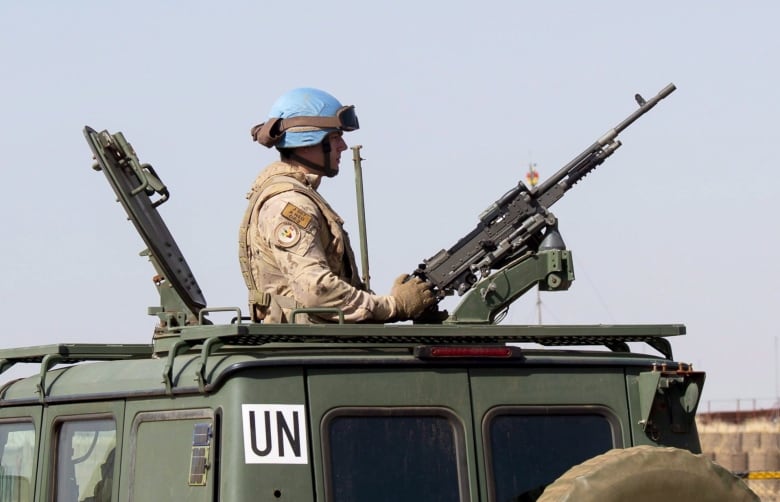Compassionate, constructive Canada not really 'back' as government bids for UN Security Council seat
Country would benefit from some real soul-searching about its place in the world

This column is an opinion by John Kirk, a professor of Latin American studies at Dalhousie University and author or co-editor of 18 books on Latin America, and Stephen Kimber, a professor of journalism at the University of King's College and author of nine books, including the award-winning What Lies Across the Water: The Real Story of the Cuban Five. For more information about CBC's Opinion section, please see the FAQ.
"Many of you have worried Canada has lost its compassionate and constructive voice in the world," Justin Trudeau told a boisterous, celebratory rally in the immediate aftermath of his 2015 federal election victory. "Well, I have a simple message for you … we're back."
But five years on, Canada is not back.
Why not? Because in foreign policy — as in much else with this Liberal government — the focus has been on style rather than substance.
Consider Canada's current bid for a UN Security Council seat, which goes to a vote later this month.
Why does Canada want the seat? Mostly, it seems, to show the world Justin Trudeau can do what Stephen Harper could not. In 2010, Harper tried to win a Security Council seat and his failure to do so was considered a major political embarrassment for the Tories.
But Trudeau's own campaign for one of the Security Council's 10 rotating, elected seats — which he launched in February 2016 with a promise that Canada was back in the UN peacekeeping business — has floundered from the beginning.
In February of this year, Trudeau made his first visit to Africa. While Masai Ujiri, the high-profile Nigerian-raised president of the Toronto Raptors, played wingman, Trudeau courted some of the world's most controversial leaders during the annual meeting of the African Union.
Africa claims 54 votes in the UN, and Canada will need at least 129 to win one of the two council seats up for grabs when the ballots are counted.
Which may also explain our leadership of the 14-nation Lima Group in its scheme to bring about regime change in Venezuela. Many of the nations in that group are led by extremely undemocratic Latin American rulers whose governments show little respect for human rights. But they all have votes at the UN.
So, too, do the Arab countries we are now hoping to influence by belatedly changing Canada's traditional position on Israel to support the Palestinian right to self-determination.
While we flatter and lobby and make quiet promises of development assistance in exchange for votes, our much smaller competitors for the seat — Ireland (population 4.9 million) and Norway (5.4 million) — boast far better credentials for the two-year position.
Ireland has long been a voice for island nations and small states, emphasizing its decades-long support for multilateralism, and for Palestinian statehood and human rights. It is the only country among the candidates to have had a continuous presence on UN peace operations since 1958.
In April of this year there were 474 Irish peacekeepers on UN missions, and 65 from Norway. Canada has just 35 — the lowest number since the creation of the first peacekeeping force in 1956.
To make matters worse, this is a far cry from the up to 600 troops and 150 police that Canada, with a population of 37.6 million, promised to provide in 2016. Meanwhile, Canada does have several hundred members of the Armed Forces in Latvia — apparently the Trudeau government feels supporting NATO military initiatives is more important than UN peacekeeping missions.

Norway and Ireland have also provided a far greater percentage of their national income (0.9 per cent and 0.4 per cent, respectively) to overseas development assistance than Canada (0.26 per cent).
Canada's questionable role in international affairs isn't helping our cause.
The rapacious conduct of Canadian mining companies in developing countries has made us "Gringos from the Far North."
In foreign policy we have consistently supported U.S. goals, not the best way to win hearts and minds in the Global South.
Compare all of that with our successful bid for a Security Council seat back in 1998. Back then Canada was a major contributor to peacekeeping forces, led an international campaign to ban landmines, helped to establish the International Criminal Court, and played an active role in multilateral institutions.
Canadian soft power garnered enormous respect around the globe, and we obtained sweeping support for our application.
It would be wonderful if Canada really were "back," but sadly it is not. The use of traditional Canadian integrity and soft power is desperately needed — and would be welcomed — on the world stage.
The Trudeau government needs to step back from empty platitudes and photo ops in developing countries, and begin a serious analysis of where our foreign policy is and where it should be — a review we haven't undertaken for decades.
Put simply, Canada doesn't deserve one of the seats on the UN Security Council, since in terms of commitment to the goals of the United Nations, Norway and Ireland have a far better moral claim. Hopefully this election process will force us to do some real soul-searching about our place in the world. It is about time.
- This column is part of CBC's Opinion section. For more information about this section, please read our FAQ.
Corrections
- This column originally referred to efforts that contributed to Canada's 1988 Security Council bid, including anti-landmine campaigning. The anti-landmine campaign was a factor in the subsequent bid in 1998.Jun 13, 2020 6:23 PM ET


